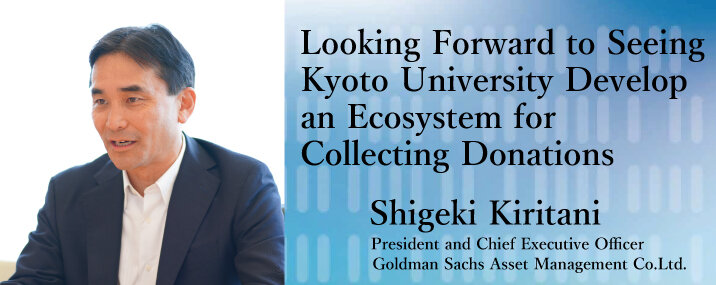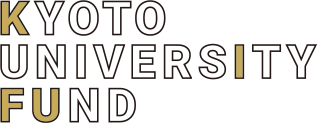Vol.15 Interview with Donors

Shigeki Kiritani
Born in Kyoto Prefecture in 1962. Joined Daiwa Securities Co. Ltd. (now Daiwa Securities Group Inc.), after graduating from Kyoto University's Faculty of Law (Okuda Seminar) in 1985. Earned an MBA from the University of California Berkeley's Haas School of Business in 1990, after working in Daiwa Securities' Finance Corporate Institution Department and at the London subsidiary. Joined Goldman Sachs Group, Inc. and co-established the Strategic Investment Division in 1998, after working in Daiwa Securities' Corporate Planning Office and Daiwa Securities America Inc.'s Commercial Mortgage Department. Became Goldman Sachs' Managing Director in 2000. Became Head of Goldman Sachs' Merchant Banking Department in 2009. Assumed his current position in 2011.
Q Is it true you had a strong motive for choosing Kyoto University?
I was a high school student when the Takigawa Incident※ occurred, and I admired Kyoto University's decision to stand up to the national government's pressure for its conviction. So it was only natural for me to apply for the Faculty of Law, where Professor Takigawa had been affiliated. However, although I am not proud of this, after entering the Faculty, I realized that I was not much interested in studying the law. So, instead of attending my classes, I spent most days playing tennis or at a mahjong parlor.
It was not until the job-search season that I began hastily preparing for the civil service examination, from which I eventually withdrew at the last minute, saving myself from becoming a government official. I did so because I fully realized that I would not be able to fit in the bureaucratic culture, which requires always doing exactly as ordered. So, I wanted a job that required dealing with market trends, since they could never be foretold with 100 percent accuracy, and decided to switch to working at a securities company. In addition, I liked the fact that the industry was in the midst of growth. I guess I could say that my temperament as a Kyoto University student awakened and guided me to the job that was right for me.
※In 1933 (Showa 8), the Ministry of Education, Science and Culture requested Yukitoki Takigawa, a Faculty of Law professor, to resign for writing communistic books and delivering lectures of the same nature. Instructors affiliated with the Faculty of Law campaigned for the protection of their University's academic freedom and autonomy without success; subsequently, 21 people, including Takigawa, left the University.
Q What was it like to study abroad at an American university for an MBA
degree as a company employee?/span>
I studied abroad at the University of California Berkeley's Haas School of Business on an in-house study abroad program that Daiwa Securities, the first company I worked at, offered its employees. Located on the West Coast, far away from the country's political center, the campus had a liberal atmosphere, which I identified as a common characteristic shared by Kyoto University.
Back then, in Japan, business administration was not yet fully recognized as an academic discipline, and such fields as investment and corporate finance were considered inferior to other fields. Therefore, finding out about its fully recognized status as an academic discipline was very refreshing, and the expertise the discipline gave me was directly applicable to the job that came my way after completing the program.
In addition, I was surprised when I found out that the president of the University of California, Berkeley, emphasized collecting donations and recruiting talented instructors and students as its mission because I could not imagine a president of a prestigious Japanese university actively collecting donations. Another big difference that surprised me was that whereas in Japan, we consider entering prestigious universities as an honor, in the U.S., it is the other way around.
Having talented students study under talented instructors increases a university's chance of future success. Successful graduates can be expected to make generous donations, which become the university's financial resources for recruiting more talent. Universities worldwide are competing in recruiting instructors and students. Winning this competition requires investing financial resources in improving scholarship systems and research environments. I look forward to seeing Kyoto University developing an ecosystem that operates as a virtuous circle of recruiting talent that delivers financial resources for recruiting more talent.
Q What kind of efforts do you look forward to seeing Kyoto University
make in this 125th anniversary year and after, and is there a message
you want to leave Kyoto University students with?
I would like Kyoto University to become able to win international competitions between universities.
Kyoto University should use its brand image to attract talented people from various backgrounds and have them produce scholarly achievements by inspiring one another to even further enhance the University's reputation and help it attract more talent. That is how a university increases its competitiveness, which essentially requires raising funds and recruiting talent.
I would like Kyoto University students to become more sensitive to what is happening in the outside world. Although this is not a new characteristic of the University's students, most Kyoto University students I have met in job interviews struck me as naive. Being knowledgeable of the outside world and yet uninterested is not the same as being ignorant.
Lastly, although I am unqualified to say this, I want Kyoto University students to take full advantage of the benefits that come with attending the University. By that, I mean study hard. After all, only students have the privilege of attending classes taught by experts leading each of their fields and asking for help with any matter they need clarification on.
(Interviewed in July 2019)


